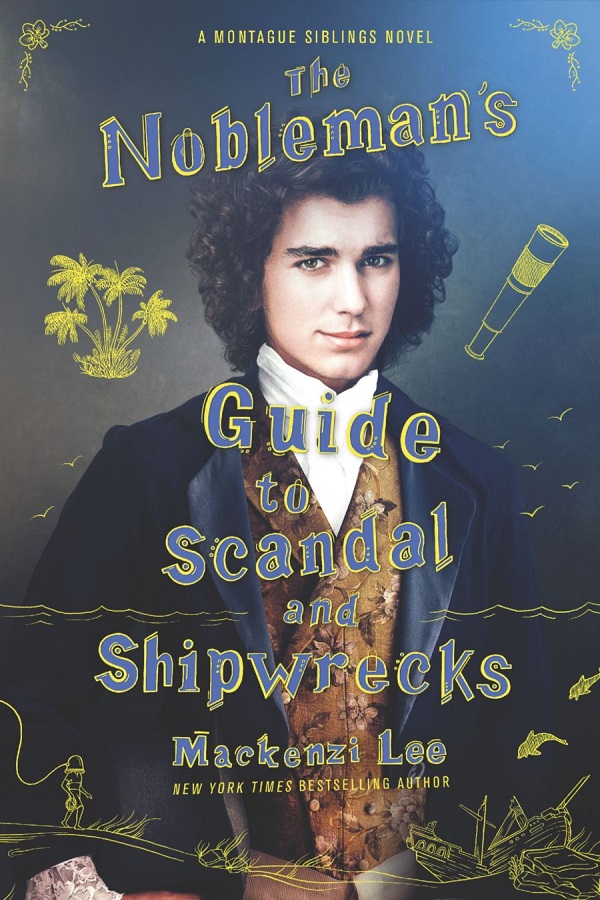
About the Book
-
Author:
- Mackenzi Lee
Cover Story: Saturday Night Fever
Drinking Buddy: More Whine?
MPAA Rating: R (sexuality, violence, drinking)
Talky Talk: Avast…
Bonus Factors: Treasure Hunt, Road Sea Trip
Bromance Status: Old Shipmate
Cover Story: Saturday Night Fever
I’m not the only one who thinks that guy looks like a young Travolta, right? Not only do I hate covers with photographs of random people, this guy doesn’t look a thing like Adrian is described in the book: pale, almost unhealthily skinny, and with resting scared face. They did the same thing with the previous book, making Felicity overly good-looking.
The Deal:
Adrian Montague is all set to inherit his father’s estate and his seat in the British Parliament. He’s wealthy, he has a hot fiancee, and the future looks bright. However, no one can know his dark and horrible secret: he secretly writes political pamphlets for The Whig Party. Essays on how the workers–the very ones his father exploits–deserve better working conditions. While his wife-to-be, Louisa, and her brother want Adrian to express his views in parliament, Adrian just can’t. His father already hates him.
In the meantime, Adrian’s mother has died in a tragic accident (or was it an accident?), leaving him nothing but memories and half of an old spyglass. What’s its significance? While researching this, Adrian makes a startling discovery: he has an older brother and sister, Monty and Felicity, both of whom were disowned by his father, Monty for his homosexuality and drinking; Felicity for her insistence that a woman could be a doctor. Soon, Adrian is dragged off on a quest, to North Africa, across Europe, and ending in far off Iceland. They face storms, ghost ships, and the Pirate Queen. Will Adrian finally find a family that likes him? Will he find out what really happened to his mother? Will he stop bloody apologizing already?
Drinking Buddy: More Whine?

Okay, I know you are already tired of this review. I know whenever you see one of my articles, you groan, and feel sorry for the FYA women who are forced to put up with a loser like me. I know reading things I’ve written is so tedious that you want to give up on the article, on FYA, and on reading in general, if you didn’t feel so sorry for me. God, I’m pathetic…
Not very attractive, huh? Well, that’s how Adrian writes. Louisa is madly in love with him, but he keeps expecting her to run off. I was actually shocked to realize they were ‘shagging’; I would have thought Adrian would have fainted if she’d suggested holding hands. Monty really owes him an explanation about family history and why he never contacted his much younger brother, but Adrian just assumes it’s because no one likes him. Adrian’s political works are groundbreaking, but Louisa and her brother have to constantly reassure him they’re not kindergarten scrawl.
In the afterword, the author describes Adrian as having an anxiety disorder, something that wasn’t understood in the 1700s. But my God, the self-loathing was almost a self-fulfilling prophecy. If your only topic of conversation is how unlikable you are, people are going to start to believe it.
MPAA Rating: R (sexuality, violence, drinking)
So the Montague siblings are not folks who are content to sit in the club drinking port and talking about the fate of the empire. Monty and Felicity have bounties on their heads from London to Rabat. They’re in bad with pirate fleets and soldiers of fortune all across Europe and Africa. And suddenly Adrian finds himself sucked into this daring life, held hostage in a harem, digging through shipwrecks, and drinking with smugglers. He’ll live up to the family name yet.
Hey, do you know what ‘French letters’ are? I had to look that one up, but apparently Adrian isn’t a milquetoast in one area.
Talky Talk: Avast…
I’m glad the author made this into a trilogy, it was nice to find out where Monty and Felicity ended up. And Adrian, despite everything, was an engaging character with a good story arc. But there were problems.
For starters, the author likes to randomly change genres. As in the previous two books, a gripping work of historical fiction suddenly turns into high fantasy without warning. I would have preferred this stay straight realistic fiction.
Also, Monty is in a long term relationship with his partner, Percy. Felicity and their friends keep pestering Monty to finally marry him before someone else steals him away. Other characters are openly homosexual.
Yes, same-sex relationships have existed since the dawn of time, and yes, homosexual marriages did exist in historical societies. But not in 18th century England, Germany, or Morocco. Monty’s reticence to tie the knot is due to his commitment phobia, and not due to the very real fear or violence or the law. Homosexuality was a jailable offense in many parts of the Western world well into the 21st century, and if the boys actually had a wedding ceremony, they’d risk a lynch mob or being sentenced to decades of hard labor. An open secret, I’d buy. Out and proud husbands in the 1700s, no way.
Also, Percy and most of the pirates were of African heritage, and absolutely every European character accepts them as equals. This was a time when the Western powers were scrambling for colonies with their unlimited supply of native labor, and when you could literally go to the store and buy a human being. Pretending racism didn’t exist makes this historical fiction pleasant, but unrealistic. The author shoehorned 2020s morality into the 1700s.
Bonus Factor: Treasure Hunt
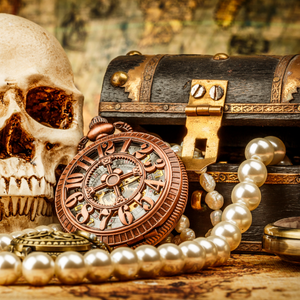
So why did Adrian’s mother insist on carrying that busted spyglass wherever she went, but abandoned it the day she died? Did she just fall off that cliff or…did she jump? What happened to her after that shipwreck in the Barbados all those years ago? The Montague siblings are going to find out.
Bonus Factor: Road Sea Trip
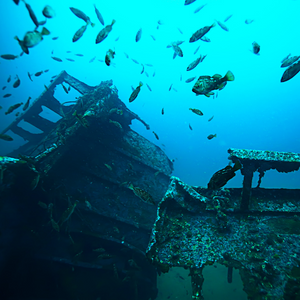
So Monty and Felicity fell in with pirates when Adrian was just a baby and are kind of part of the merry crew. Except for the fleets that want them dead. Adrian finds himself chasing clues from Rabat to Amsterdam, from the Azores to Reykjavik. Maybe he’s not the wimp everyone thinks he is. Or maybe no one ever actually thought that.
Bromance Status: Old Shipmate
I enjoyed our voyages together, but I think I’ll bid this series a bon voyage.
Literary Matchmaking
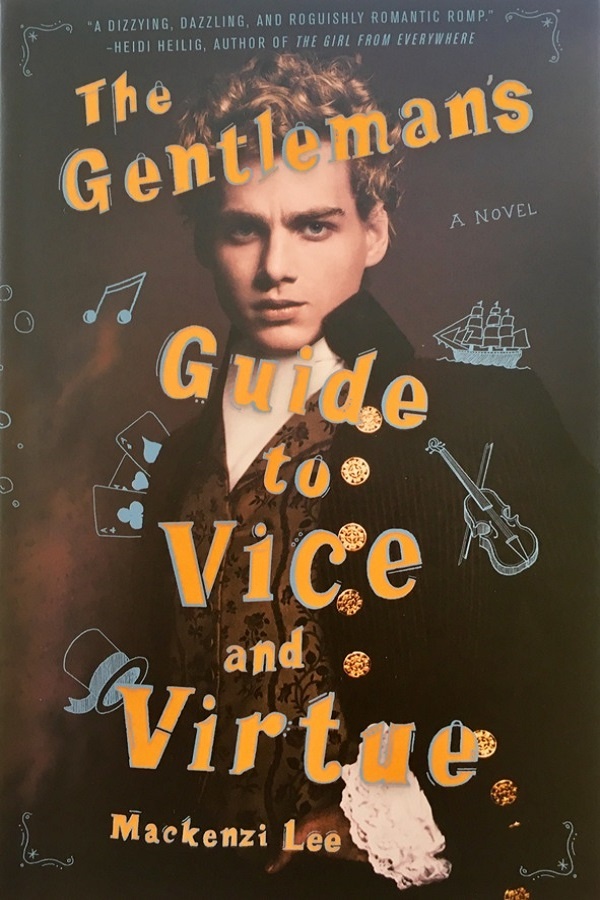
The Gentleman’s Guide to Vice and Virtue introduces us to young Lord Monty.
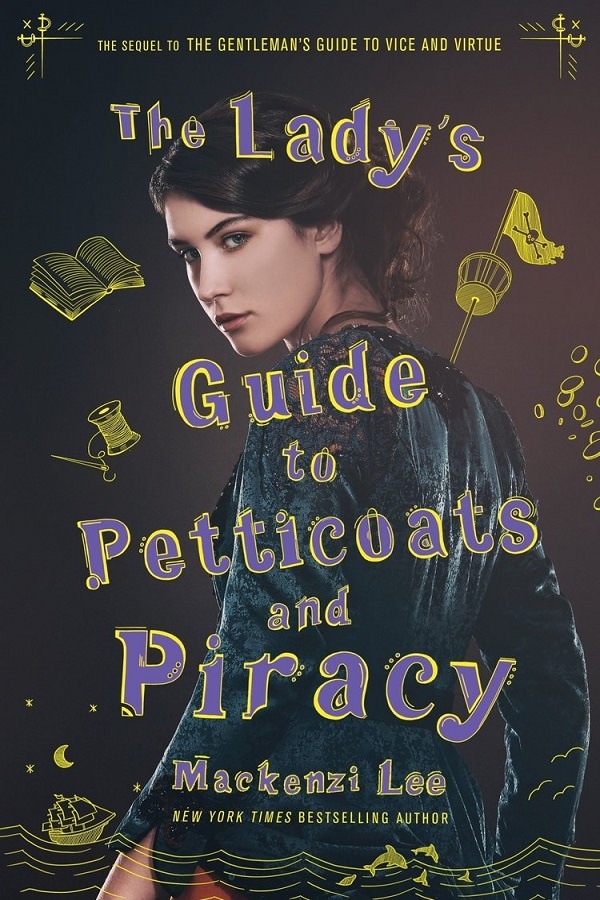
The Lady’s Guide to Petticoats and Piracy introduces us to Felicity.

Tricia Levenseller’s Daughter of the Pirate King is another swashbuckling high seas adventure.
Wow so if I was to summarise your review it would be:
– nobody wants to read a book from the point of view of someone with an anxiety disorder; and
– even though this book clearly is steeped in fantasy, we should only see queer characters hide and be ashamed rather than find community and celebrate their love within their community.
Those are some real hot takes.
I didn’t get that from the review.
I’m not saying that at all. The first two books dealt with Monty and Percy’s forbidden love, trying to survive in a world where if anyone got word of their relationship, they’d both be sent off to prison or hanged, with not even Felicity approving of them being together. And now, suddenly, they’re worried about who’s going to cater their wedding. I think that not only subverts the message of the first two books, but negates the struggles of LGBTQ people throughout history. Pretending they never faced prejudice isn’t honoring their memories.
And of course I want to read books from the POV of neurodivergent characters. I’ve reviewed a lot of them here. But not Adrian. The man was simply annoying.